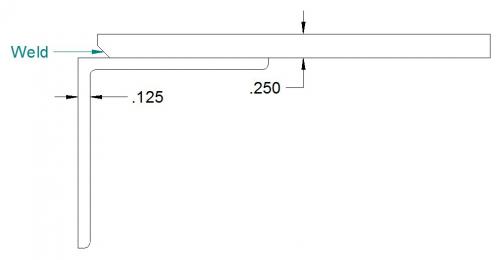Posts: 8,888
Threads: 320
Joined: Feb 2012
Location: Arizona/Minnesota
(06-01-2013, 06:09 PM)doubleboost Wrote: (06-01-2013, 06:05 PM)EdK Wrote: I'm going to fire up the welder tomorrow and make sure there's still gas left in the tank and also to get some practice in before Arvid comes and shows me how it's supposed to be done. Anyway, I was wondering if when welding two different thicknesses of metal together you should bevel the edge of the thicker piece? See drawing below.
I'm assuming I should try and aim the MIG wire mostly towards the thicker piece. Is this correct?
Thanks,
Ed
If you prep the weld like that it should weld very nice
You will need a good 120 amps and 0.8 wire
John
John,
I got the .8 (.030") wire so I'll use that. Where should I aim the wire at?
Ed
Posts: 3,003
Threads: 51
Joined: Apr 2012
Location: Ontario
On something like that I'd bring the power way up, (not sure the numbers, but go scary hot) And you can melt the thinner angle into the heavier plate with little to no chance of burning through.
Where the leg of the angle meets the plate go straight in with the wire weaving back and forth covering at least 1/8 inch of the angle. On the corner at a 45 to go straight into the joint again weaving the pattern,
Thats assuming you can lay it flat, if it is an overhead weld same process but bring the power down so the weld doesn't sag.
I wouldn't bother chamfering the plate, with the power up you'll get lots of penetration.
.035 or .045 wire would be beter and tri mix gas with oxygen but if you weld thin material the oxygen makes it impossible.
Free advice is worth exactly what you payed for it.
Greg
Posts: 8,888
Threads: 320
Joined: Feb 2012
Location: Arizona/Minnesota
(06-01-2013, 07:04 PM)f350ca Wrote: On something like that I'd bring the power way up, (not sure the numbers, but go scary hot) And you can melt the thinner angle into the heavier plate with little to no chance of burning through.
Where the leg of the angle meets the plate go straight in with the wire weaving back and forth covering at least 1/8 inch of the angle. On the corner at a 45 to go straight into the joint again weaving the pattern,
Thats assuming you can lay it flat, if it is an overhead weld same process but bring the power down so the weld doesn't sag.
I wouldn't bother chamfering the plate, with the power up you'll get lots of penetration.
.035 or .045 wire would be beter and tri mix gas with oxygen but if you weld thin material the oxygen makes it impossible.
I have 75/25 argon/co2 gas.
Ed
Posts: 3,003
Threads: 51
Joined: Apr 2012
Location: Ontario
That is by far the most common mix Ed. I seem to weld heavier material 99% of the time so tried a mix of argon co2 and 2 or 3% oxygen. With .035 wire it feels like welding with 1/8 7018 stick. The oxygen makes the weld puddle way hotter giving beter penetration. When I bought the welder I knew nothing about mig (still don't) so opted for one with a processor that sets all the parameters for you (hence I never pay attention the voltage or wire feed rate) You input the type of gas, wire size and metal and it sets the voltage and wire speed based on the thickness you tell it your welding. Works pretty well but I usually go two thicknesses or 1/8 thicker than I'm welding if its horizontal, for overhead its spot on. But 1/8 is about as thin as I can go with that gas, I keep a small bottle of argon co2 and .025 wire around if I need to weld sheet metal.
Free advice is worth exactly what you payed for it.
Greg






